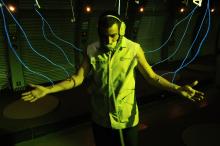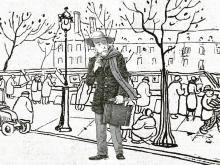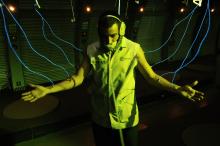Registration for Spring Quarter begins February 10, which means students can enroll in many of the interesting courses offered in the Department of Spanish and Portuguese Studies! Some of these classes are special topics that may only be offered once, while others are offered by the department on a rotational basis. The list below is a summary of some the featured classes we will be offering. For information regarding applicability of a given course for the Spanish major or minor, consult the Spring Quarter 2017 Time Schedule for Spanish or Portuguese or email the SPS Academic Advisor.
PORT 365 / JSIS A 365: Mapping Luso-Brazilian Cultures
PORT 365 explores Afro-cultures of Brazil, Mozambique, and Portugal within the framework of cultural studies theory. It follows an interdisciplinary approach drawing from readings and films in history, literature, the arts, anthropology, and sociology. Highlights of the course include a collaborative project with university students in Mozambique, and an optional 2 credit language trailer for those who speak Portuguese, PORT 366.
Instructors: Eduardo Silva, Kent Kinzer M W, 1:30-3:20, 5 credits. Jointly offered with the Jackson School of International Studies. PORT 365 Taught in English.
SPAN 313: Business Communication in Spanish
SPAN 313 is aimed at developing foreign language skills and understanding of business practices in the Spanish speaking world. Students will also learn sociocultural characteristics so needed in a global economy of the new millennium. Course highlights include case studies of current innovative companies in Seattle, open panels in the classroom with successful Latin American entrepreneurs in our community, and online collaborative activity via Teletandem with students from Universidad Europea Miguel de Cervantes (Valladolid, Spain).
Instructor: Marilís Mediavilla M W, 12:30-2:20, 5 credits. Course Taught in Spanish.
SPAN 394: La distopía en el cuento español y latinoamericano
Este curso examina el desarrollo del cuento en España y Latinoamérica en los siglos XIX y XX, y la construcción de mundos distópicos o cacotópicos en este tipo de narrativa. Nos concentraremos en definir en qué consiste la cacotopía y la distopía, y en cómo estos mundos malévolos ficticios nos hacen reflexionar sobre nuestro propio mundo. A la misma vez, nos enfocaremos en el aprendizaje de un vocabulario crítico, fomentando así nuestra habilidad de hablar formalmente de la literatura y de escribir ensayos analíticos en español.
Professor: Leigh Mercer T Th, 11:30-12:50, 3 credits. Course Taught in Spanish.
SPAN 410: Creative Writing in Spanish
El Taller de creación, SPAN 410 es para estudiantes del último año (puede haber excepciones, como siempre las hay en el arte) que estén seguros de su devoción artística y, más que nada, de su redacción. El último día habrá un recital del grupo con invitados y un excelente despliegue gastronómico.
Professor: Edgar O’Hara T Th, 11:30-1:20, 5 credits. Course Taught in Spanish
SPAN 461: Marginalized Actors in Latin American Fiction (1900-1950)
SPAN 461 focuses on socially marginalized narrators and eccentric characters of Latin American novels and short stories of the first five decades of the 20th century, with a strong emphasis on the countries of the Southern Cone (Argentina, Chile, and Uruguay). Some of the authors included in this course, resembling their own characters, are lesser known than other writers from the same period. This course will analyze different aspects of Argentinian, Chilean, and Uruguayan social life of the margins as tied to literature. Working-class people, as well as marginalized writers, scientists, wanderers, and flâneurs, will be featured in this seminar.
Professor: José Francisco Robles M W, 1:30-3:20, 5 credits. Course Taught in Spanish.
SPAN 462: La cultura "pop" contemporánea en España
¿Qué constituye la cultura pop en una nación que se conoce más comunmente por sus tradiciones folklóricas y románticas? Este curso provee una introducción a la identidad española al examinar una variedad de expresiones de cultura popular de la España contemporánea. Nos enfocaremos en el sentido más ámplio de la cultura pop en una nación que se suele entender a través de las prácticas del toreo y el flamenco, o de la noción del gitano apasionado. De esta forma iremos más allá de los cliches y mitos de una cultura tan frecuentemente estereotipada para examinar lo que hoy en día es una nación chocantemente moderna.
Professor: Leigh Mercer T Th, 1:30-3:20, 5 credits. Course Taught in Spanish.
Additional content for this article provided by Marilís Mediavilla, Leigh Mercer, Edgar O'Hara, José Francisco Robles, and Eduardo da Silva.






